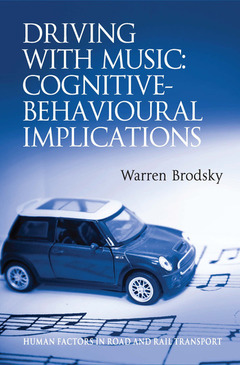Description
Driving With Music: Cognitive-Behavioural Implications
Human Factors in Road and Rail Transport Series
Author: Brodsky Warren
Language: English
Subjects for Driving With Music: Cognitive-Behavioural Implications:
Keywords
In-car Music; listening; Driver Distraction; background; Vehicular Control; in-car; Increased Driver Safety; song; In-car Listening; prefer; Young Novice Drivers; audio; Incar Music; system; Driving Performance; driver; Car Songs; distraction; Perceptual Masking; cassette; Simulated Driving; Van Der Zwaag; Warning Signals; Music Tempo; Young Men; Young Drivers; IVDR; Glance Durations; Affect Drivers; Pe Rc; Music Programme; Secondary Tasks; Driving Task; Musical Preferences; Full Feature Films
Publication date: 03-2015
· 15.6x23.4 cm · Hardback
Publication date: 07-2017
· 15.6x23.4 cm · Paperback
Description
/li>Contents
/li>Biography
/li>
Automobility: Car Culture and Popular Music. Background Music in Everyday Life: The Listener and Effects of Music on Listeners. In-Care Audio Culture: The Benefits of Driving with Music. Contraindications to In-Care Music Listening. Ill-Effects of In-Car Music Listening. Implications, Countermeasures, and Applications: Music Alternatives for Increased Driver Safety. Postscript.




